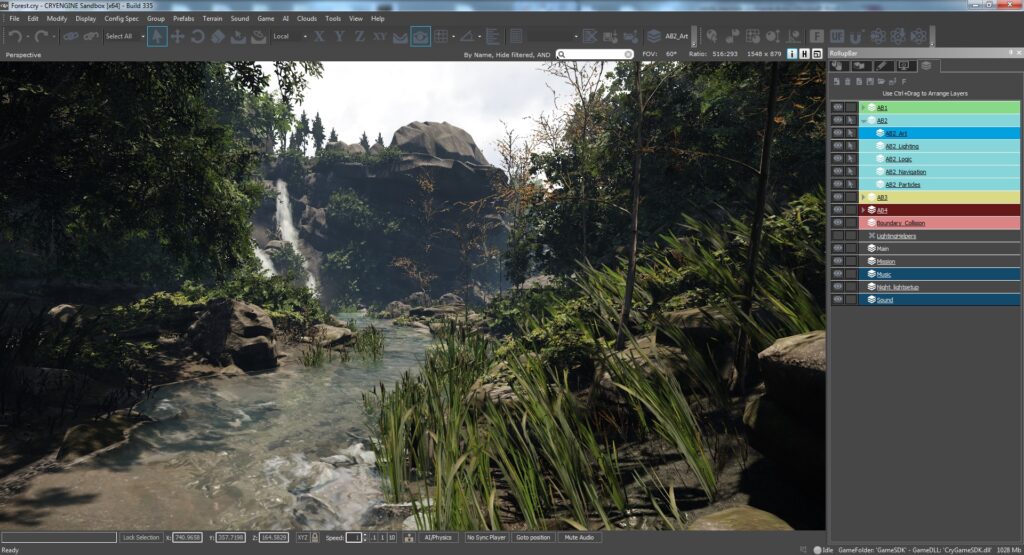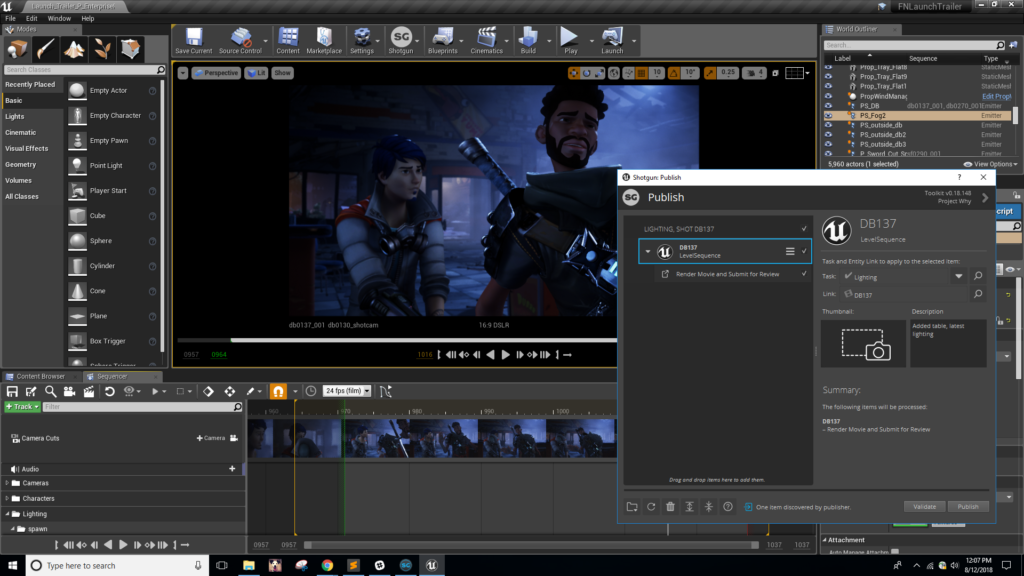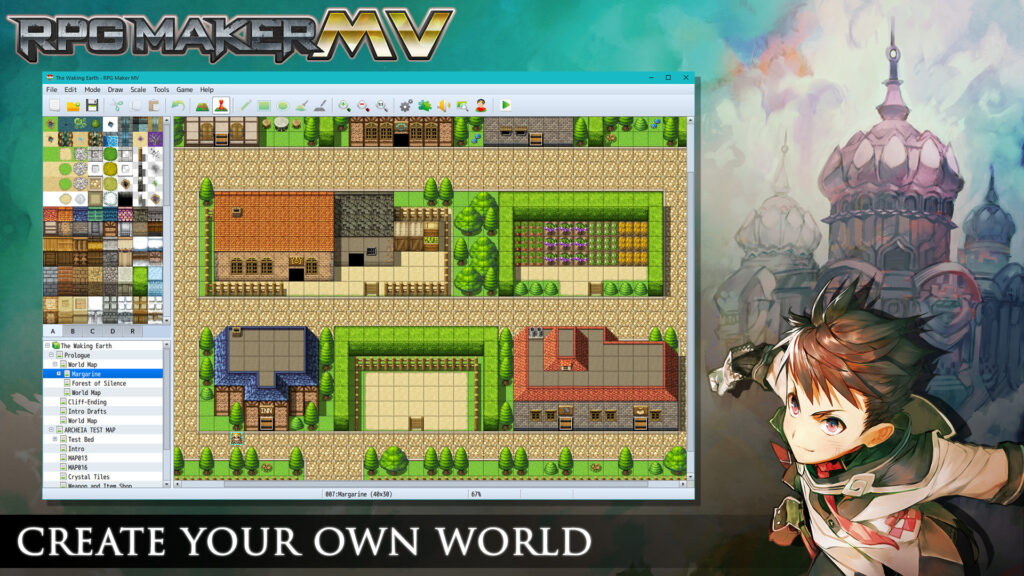
Best Game Engines Out Right Now
Game engines are the foundation on which the rest of the game is laid. It’s the inner workings under the surface and how the game developers interact with the game. The choice of game engine an individual or company uses is one of the earliest and most important choices in the game development process and it will guide the way you make the game from that point forwards.
Each engine specializes in different aspects but most of them will be able to do anything you need. Many bigger companies will use their own in house game engines that they either built from scratch or heavily modified a pre-existing one. As these are incredibly numerous and varied and many of them not available for use outside of their respective companies, we are only going to look at the best game engines available to anyone, right now.
CryEngine

Price: Free
Royalties: 5% over $5000 revenue
CryEngine Games: Far Cry, Crysis, Prey
CryEngine is a game engine developed by Crytek and was first used in the original Far Cry game. This engine then gained real notoriety with CryEngine 2.0 which released with Crysis (They really like their naming schemes). Crysis was, at the time, at the forefront a graphics technology and was the benchmark for game graphics for a significant amount of time. This gave CryEngine its well-earned reputation as an engine with top quality rendering technology.
As the competition has grown CryEngine is not used as often as it once was outside of Crytek itself. Whilst it’s still available, some of the other engines in this list have become much more popular and the use of CryEngine has faded more into the background. That being said, like many game engines these days, it’s now free to use with the only payments that need to be made are 5% of any revenues made after $5000 when selling a product using the engine.
Amazon Lumberyard

Price: Free
Royalties: None
Lumberyard Games: Star Citizen, The Grand Tour
Amazon has recently made the plunge into the world of game engines thanks to Lumberyard. An offshoot of CryEngine that was purchased by Amazon, Lumberyard is now its own fully-fledged game engine available for anyone to use. As it’s based on Crytek’s CryEngine you can be sure that the graphics and rendering capabilities of the engine are top-notch.
One of the things unique to Amazon’s Lumberyard is that there is no upfront cost and no royalties, you can use the game wherever you want for free. What’s the catch? Amazon integrates it’s Amazon Web Service into the engine and requires that you use it for any 3rd party applications you need. An example of this could be server hosting, which will need to be brought through Amazon if you are using Lumberyard. The plus side is, it’s totally possible to create a full game without needing any of these services, so it can still be used entirely free.
Unity

Personal (<$100,000 revenue): Free
Plus (<$200,000 revenue): $40/month
Pro (>$200,000 revenue): $150/month
Unity Games: Outer Wilds, Legends Of Runeterra, Human Fall Flat, Untitled Goose Game
Now we get to the big two. Unity is easily one of the most widely used game engines in the world. Whilst it’s rendering capabilities might not stand up to most of the others on this list, its huge popularity comes from its relative ease of use and great flexibility. It can produce anything from the next AAA shooter game for next-gen consoles to a 2D platformer for the mobile.
One big advantage Unity has it its robust asset store where anyone can upload content that others have made and can have a licence for it to use in their product. Many of these are free or have a relatively low cost and can save even the most professional teams a huge amount of time, money and effort in producing it themselves.
Unity has gained a bit of a reputation recently for producing bad quality games. Whilst there are plenty of badly made Unity games out there, this is not a problem with Unity itself, if anything it’s the curse of their own success. Having such a low barrier to entry and access to downloadable assets has democratised the game making process and allowed anyone to give it a try. While this is great news it has unfairly earned Unity a reputations of poor quality games.
Overall Unity is a great game engine with huge scope and ability to adapt. As a first engine to use while getting to know the ropes, you can’t do much better than Unity.
Unreal Engine

Unreal Engine: Free
Royalties: 5% over $3000 revenue
Unreal Engine Games: Final Fantasy VII: Remake, Sea Of Thieves, The Outer Worlds
Unreal Engine is currently one of the biggest and best game engines on the planet. Created by Epic Games, the creators of Fortnite, Unreal Tournament and Gears of War, it is the most widely used and one of the most powerful engines out there. Due to Epic Games’ active development of games, the engine is always being updated with the latest tech that they have developed for their most recent game.
While the engine is not as easy to get to grips with as the likes of Unity, Unreal Engine is by no means a difficult engine to learn. It’s very easy to get to grips with the basics, while still allowing advanced users to dive deeper into the more complex functions. It’s also possible to heavily edit the engine to your needs allowing more flexibility.
As the complexity of games increases and as such the costs of developing games also increases, many more companies are looking for a pre-made game engine that they can use out of the box, rather than developing their own. Many of those companies are now looking to Unreal to fulfill that need.
For those of us that are not programmers, Unreal has some visual scripting in it’s ‘blueprints’ feature so that you can achieve some basic and some advanced gameplay features that would otherwise require programming. Whilst the system is not ideal and very unpopular with programmers due to its limitations and inefficiencies, it is the ideal system for people without that knowledge to achieve what you otherwise could not. That being said, full games have been made using only blueprints.
Unreal’s rendering software is state of the art. Epic are often pushing the boundaries of what is possible in games and handing their hard work down to everyone else to create the best games possible.
If you would prefer simplicity and ease of use from your game engine, Unity might be the best one to start with, otherwise, I think you would be hard-pressed to beat Unreal. Not only does it give you a powerful set of tools to create a beautiful and well-optimized gaming experience but the knowledge you gain will be interchangeable between a huge amount of projects thanks to the widespread use of the engine.
Honorable Mentions
GameMaker

GameMaker Creator: $39/Year
GameMaker Developer: $99/year
GameMaker Games: Risk Of Rain, Hotline Miami, Katana Zero
GameMaker is a long-running game engine by YoYo Games used to create 2D games. It’s an incredibly easy to use game engine that allows you to make a simple game without the need for any coding knowledge, instead, it uses a basic interface that replaces the complex coding language with an easy to understand system.
Its limitations lie in the fact that it is primarily a 2D engine and the simplicity of the engine also limits the complexity of the games you can create to a certain degree. That being said some of the bigger 2D games of previous years have been made in GameMaker so it’s possible to create massive games using it.
Overall it is the perfect game engine to make your first workable game and get an understanding of how game engines work. It is also possible to create some impressive experiences if you know how to use it.
RPG Maker

RPG Maker: $79.99
RPG Maker Games: To The Moon, Lisa: The Painful, Corpse Party
RPG Maker is a long-running game engine designed specifically for the creation of RPG games. It specializes in 2D story-based games with the stories told through text boxes. It uses a tile-based system that allows you to assemble 2D square images called ‘sprites’ into a world that can then be interacted with. This allows a lot of reuse of assets allowing you to build a large world very fast.
One of the main benefits of RPG Maker is its simplicity. It provides a very simple way of building a game with nothing but an idea and a story, this opens the door to many people that do not have game development experience to make great games without getting held up by the technical aspects.
The downside to the simple nature of the software is that it can be difficult to achieve something special that stands out from the crowd. Many games made in RPG Maker have some tell-tale signs that they are. That being said it’s possible to create a truly unique experience.